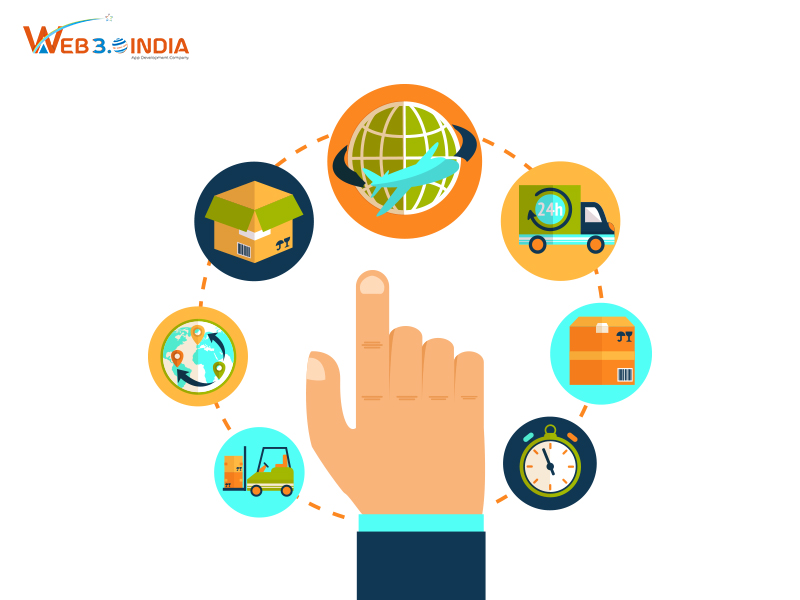Introduction
Originally built to facilitate cryptocurrencies like Bitcoin, blockchain technology has evolved into a game-changing instrument for contemporary businesses. Enterprise blockchain applications are currently transforming business endeavors by enhancing security, efficiency, and transparency. These applications empower secure, straightforward, and decentralized record-keeping and data sharing, disposing of delegates and lessening operational costs.
Additionally, in the real estate market, blockchain technology is being used to tokenize resources, address proprietorship digitally, and consider lower investment thresholds in rental properties. By utilizing enterprise blockchain applications, businesses can accomplish more prominent operational efficiency, reduce costs, and improve trust among partners, situating themselves for progress in the digital age.
Blockchain in Supply Chain Management
Supply chain management has seen an insurgency because of blockchain technology, which gives extraordinary degrees of security, efficiency, and receptiveness. Organizations might guarantee authenticity and ethical sourcing by tracking products from the starting place to delivery by utilizing decentralized ledgers.
Through indisputable item accounts, this development works on operational operations and makes purchasers trust. Blockchain guarantees start-to-finish perceivability, limits failures, reduces fraud, upgrades compliance, and constructs customer entrust with verifiable product histories.
Enhancing Transparency in Global Supply Chains
Consumers today expect increased perceivability from the items they buy. Blockchain tends to this need by giving a straightforward and immutable record of an item’s excursion.
- Real-world use case: Walmart, in a joint effort with IBM, has executed a blockchain answer to follow the origin of food products. This initiative permits consumers to get detailed information about the food’s excursion, from homestead to retirement, guaranteeing security and quality.
- Benefits: This approach upgrades item traceability, reduces fraud, and smoothes out processes by empowering speedy admittance to item chronicles, accordingly improving purchaser certainty and operational efficiency.
Improving Efficiency in Logistics
Logistics operations frequently include complex documentation and coordination among various gatherings. Blockchain works on these cycles, prompting quicker and more solid shipping.
- Example: Maersk, in an organization with IBM, fostered the TradeLens platform; a blockchain-based answer for global shipping. This platform digitizes and automates the progression of information across the supply chain, decreasing dependence on paper documents and manual cycles.
- Outcome: The execution of TradeLens has brought about reduced paperwork, quicker shipping times, and limited debates, enhancing by and large supply chain efficiency.
By incorporating enterprise blockchain applications, businesses can accomplish a more straightforward, proficient, and secure supply chain, satisfying the developing needs of the modern marketplace.
Blockchain in Healthcare
Blockchain technology is revolutionizing the healthcare area by upgrading data security, working on patient care, and streamlining operations. Its decentralized and immutable nature tends to cause basic difficulties in overseeing sensitive health information and guaranteeing the honesty of pharmaceutical supply chains. Blockchain empowers secure data sharing, upgrades patient privacy, further develops interoperability, and guarantees exact clinical record management.
Revolutionizing Patient Data Management
Overseeing patient data safely and proficiently is a foundation of value healthcare. Blockchain offers a hearty arrangement by giving a protected, straightforward, and immutable stage for electronic health records (EHRs).
- Real-world use case: Blockchain-based EHRs empower secure and productive patient data division between authorized healthcare providers. This approach guarantees that patient information is open while required, improving the nature of care.
- Benefits: Carrying out blockchain in EHRs improves patient privacy by guaranteeing that authorized people can get access to sensitive information. It likewise guarantees data honesty, as records can’t be adjusted without consensus, and smoothes out operations by lessening administrative burdens and minimizing blunders.
Enabling Drug Traceability and Supply Chain Security
For the benefit of patient health, pharmaceutical security and authenticity must be guaranteed. Blockchain transparency and security combat problems like fake medications by increasing the pharmaceutical supply chain.
- Example: PharmaLedger’s blockchain project expects to battle counterfeit drugs by giving a straightforward and immutable record of pharmaceutical products from production to delivery. This drive improves trust among partners and guarantees the uprightness of the supply chain.
- Outcome: The implementation of blockchain in pharmaceutical supply chains expands trust and well-being by enabling partners to confirm the authenticity of drugs, diminishing the gamble of counterfeit products entering the market.
By coordinating enterprise blockchain applications, the healthcare business can accomplish upgraded data security, work on patient care, and create a more straightforward and effective supply chain, eventually prompting better health outcomes.
Blockchain in Finance
Blockchain technology is changing the financial sector by upgrading transaction efficiency, security, and transparency. Its decentralized and immutable nature tends to have long-standing difficulties in cross-border payments and financial data security, positioning blockchain as a foundation of the current financial framework.
Transforming Cross-Border Payments
Conventional cross-border transactions are often slow and costly, including different intermediaries and complex cycles. Blockchain technology smoothes out these transactions, empowering quicker and more cost-effective international payments.
- Real-world use case: Wave’s blockchain network works with moment global transactions by interfacing with banks and payment providers worldwide. This network takes into consideration real-time gross settlement, currency exchange, and remittance through its digital payment convention.
- Benefits: Carrying out blockchain in cross-border payments brings about quicker settlements, essentially lessening transaction times from days to seconds. It additionally brings down fees by wiping out the requirement for intermediaries and diminishes dependence on journalist banking networks, improving general efficiency.
Strengthening Security in Financial Transactions
Guaranteeing the security and integrity of financial data is the principle in the banking business. Blockchain technology offers strong answers for secure data sharing and transaction handling.
- Example: JPMorgan’s Majority blockchain stage is intended for secure data sharing inside permissioned networks. The majority improves privacy and performance, making it reasonable for financial applications requiring high velocity and high-throughput handling of private transactions.
- Outcome: Using blockchain stages like Majority prompts further developed consistency with regulatory requirements through transparent and immutable record-keeping. It likewise improves blockchain transparency and security among authorized parties and helps in extortion counteraction by guaranteeing data integrity and decreasing the risk of unauthorized alterations.
By incorporating blockchain applications, the financial business can accomplish more efficient, secure, and transparent operations, satisfying the advancing needs of the global economy.
Key Advantages of Enterprise Blockchain Applications
Enterprise blockchain applications are altering ventures by presenting decentralized and immutable systems that improve operational efficiency and security. By utilizing circulated ledger technology, businesses can accomplish more noteworthy transparency, smooth out processes, and shield data honesty.
Enhanced Transparency
Blockchain’s decentralized ledger permits generally approved members to get to similar data at the same time, cultivating a solitary wellspring of truth. This transparency reduces discrepancies and fabricates trust among partners. For example, blockchain in supply chain management, empowers constant tracking of goods, permitting buyers to check product origins and authenticity. This degree of transparency upgrades brand reputation and guarantees compliance with regulatory standards.
Similarly, businesses, for example, finance benefit from transparent transaction histories, which work with auditing and decrease the gamble of fraud. Blockchain ensures that all transactions are traceable and verifiable by providing a fixed record of them.
Improved Efficiency and Cost Savings
Carrying out blockchain technology smoothes out operations via automating processes and disposing of delegates. Smart agreements and self-executing agreements coded on the blockchain automate workflows, decreasing manual intercession and the potential for blunders. This mechanization prompts massive cost savings and speeds up transaction times. In the logistics area, for instance, blockchain reduces desk work and expedites shipping processes, bringing about quicker conveyances and lower operational costs.
Furthermore, the healthcare business benefits from blockchain by empowering the secure and effective sharing of patient records, subsequently lessening regulatory weights and working on patient care. Generally speaking, the efficiency gains from blockchain adoption convert into a more light-footed and responsive business climate.
Robust Security and Fraud Prevention
Blockchain’s cryptographic security measures and decentralized nature make it profoundly impervious to tampering and cyberattacks. Every transaction is encoded and connected to the past one, making an immutable chain that is almost difficult to change. This robust security structure forestalls unapproved access and guarantees data respectability.
In the financial area, blockchain’s security highlights safeguards against fraud and unapproved transactions, subsequently safeguarding assets and touchy data.
Besides, the healthcare business uses blockchain to store patient data, guaranteeing privacy and safe compliance with data protection regulations. By moderating the dangers related to concentrated databases, blockchain creates a solid climate for digital transactions and data management.
To sum it up, enterprise blockchain applications offer critical benefits across different businesses, including enhanced transparency, improved efficiency, cost savings, and robust security. As businesses proceed to investigate and execute blockchain arrangements, these advantages are ready to drive development in the digital economy.
Conclusion
Blockchain technology is reforming areas such as supply chain management, healthcare, and money by upgrading transparency, efficiency, and security. In supply chain management, blockchain empowers real-time tracking of goods, guaranteeing authenticity and diminishing fraud. In healthcare, it works with the secure sharing of patient records, further developing care coordination. In finance, blockchain smoothes out transactions, decreasing costs and settlement times.
Businesses are urged to investigate blockchain answers to drive advancement and development. Organizations like Web 3.0 India offer exhaustive blockchain development administrations, including DeFi development, smart agreement development, and NFT marketplace development, customized to different enterprises.








